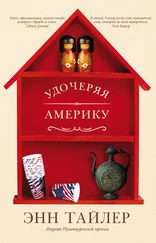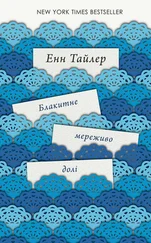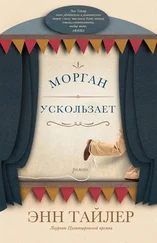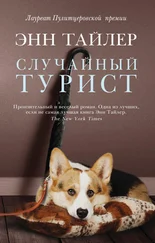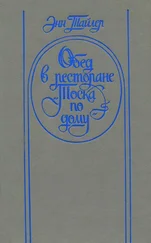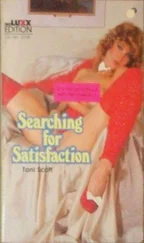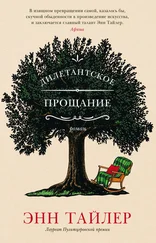“Oh, we’re used to it, we do it often,” Justine said.
“Often! You go looking for his brother often?”
“Whenever we have some kind of lead,” said Justine. “Some name or letter or something. We’ve been at this several years now. Grandfather takes it very seriously.”
“He’ll never find him, of course,” said Mrs. Tabor.
Justine was silent.
“Will he?”
“Maybe he will.”
“But — nineteen twelve! I mean—”
“Our family tends to live a long time,” Justine said.
“But even so! And of course, dear,” she said, leaning forward suddenly, “it must be hard on you. ”
“Oh no.”
“All that wandering around? I’d lose my mind. And he can’t be so easy to travel with, his handicap and all. It must be a terrible burden for you.”
“I love him very much,” said Justine.
“Oh, well yes. Naturally!”
But the mention of love had turned Mrs. Tabor breathless, and she seemed delighted to hear the bathroom door clicking open. “Well, now!” she said, turning to Justine’s grandfather.
He came into the room searching all his pockets, a sign he was preparing to leave a place. Justine rose and hoisted her straw bag. “Thank you, Mrs. Tabor,” she said. “I’m sorry about your husband. I hope we haven’t put you to any trouble.”
“No, no.”
The grandfather ducked his head in the doorway. “If you should recollect at some later date . . . ” he said.
“I’ll let you know.”
“I wrote my Baltimore number on my calling card. Justine has no phone. If you should chance to think of something, anything at all . . . ”
“Will do, Mr. Peck,” she said, suddenly jaunty.
“You do?”
“What?”
“She will do. Grandfather,” Justine said, and led him into the hall. But he did not hear and was still turned to Mrs. Tabor, puzzled and unhappy, when the door swung shut and the locks began tumbling into place again.
* * *
In the railroad station they sat on a wooden bench, waiting for the next train home. Justine ate a sack of Fritos, a Baby Ruth, and two hot dogs; her grandfather would not take anything. Neither of them liked Cokes and they could not find any root beer so they drank warm, bleachy New York water begged from a concession stand. Justine finished the last of her cough drops. She had to go buy more, paying too much for them at a vending machine. When she came back she found that her grandfather had fallen asleep with his head tipped back and his mouth open, his empty hands curled at his sides. She moved some sailor’s unattended seabag over next to him and adjusted his head to rest upon it. Then she opened her carry-all and took out magazines, scarves, a coin purse, road maps and unmailed letters and a snaggle-toothed comb and a clutch of candy wrappers, until at the very bottom she came upon a deck of playing cards wrapped in a square of old, old silk. She unwrapped them and laid them out on the bench one by one, choosing places for them as surely and delicately as a cat chooses where to set its paws. When she had formed a cross she sat still for a moment, holding the remaining cards in her left hand. Then her grandfather stirred and she gathered the cards quickly and without a sound. They were back in their silk before he was fully awake again, and Justine was sitting motionless on the bench with her hands folded neatly over her straw bag.

2
On moving day they were up at five, not because there was any rush but because the house was so uncomfortable now with everything packed, the walls bare and the furniture gone, no place to sleep but mattresses laid upon newspapers. All night long one person or another had been coughing or rearranging blankets or padding across the moonlit floor to the bathroom. People fell out of dreams and into them again, jerking awake and then spiraling back to sleep. The hollow walls creaked almost as steadily as the ticking of a clock.
Then Justine rose and stalked around the mattress, working a cramp out of one long, narrow foot. And Duncan opened his eyes to watch her fling on her bathrobe, all flurry and rustling and sleight-of-hand. Darkness swirled around her, but that was only chenille. “What time is it?” he asked. “Is it morning yet?”
“I don’t know,” she said.
Neither of them wore watches. On them, watches broke or lost themselves or speeded up to keep some lawless schedule of their own so you could almost see the minute hand racing around the dial.
Duncan sat up and felt for his clothing, while Justine sailed through the living room. Her gritty bare feet whispered on the floor and her bathrobe sash galloped behind. “Coming through! Excuse me! Coming through!” Her daughter’s bedclothes stirred and rumpled. In the kitchen, Justine switched on the light and went to the sink to make tap-water coffee. The room gave off an icy chill. Everything was bare, scraped and smudged by the past — four bald spots on the linoleum where the table had once stood, and dimples where Duncan had tipped back in his chair, scorches and chips on the countertop, the uncurtained window filmed with cooking grease, the rickety wooden shelves empty but still bearing rings of molasses and catsup. Justine made the coffee in paper cups and stirred it with a screwdriver. When she had set the cups on the counter she turned to find her grandfather teetering in the doorway. Noise could not wake him, but light could. He wore withered silk pajamas and held his snaptop pocket watch open in his hand. “It’s five ten a.m.,” he said.
“Good morning, Grandfather.”
“Yesterday you slept till noon. Regularity is what we want to aim for here.”
“Would you like some coffee?”
But he hadn’t heard. He pursed his lips and snapped the watch shut and went back to his bedroom for his clothes.
Now throughout the house came the sounds of people dressing, doors opening and closing, teeth being brushed. Nobody spoke. They were struggling free of their dreams still — all but Justine, who hummed a polka as she darted around the kitchen. In her flimsy robe, flushed with heat when anyone else would be shivering, she gave an impression of energy burning and wasting. She moved very fast and accomplished very little. She opened drawers for no reason and slammed them shut, pulled down the yellowed windowshade and let it snap up again. Then she called, “Duncan? Meg? Am I the only one doing anything?”
Duncan came in with his oldest clothes on: a white shirt worn soft and translucent and a shrunken pair of dungarees. His arms and legs gawked out like a growing boy’s. He had a boy’s face still, the expression trustful and the corners of his mouth pulled upward. With his hair and skin a single color and his long-boned, awkward body he might have been Justine’s brother, except that he seemed to be continually turning over some mysterious private thought that set him apart. Also he moved differently; he was slower and more deliberate. Justine ran circles around him with his cup of coffee until he stopped her and took it from her hands.
“I could be dressed and gone by now, the rest of you would still be lolling in bed,” she told him.
He swallowed a mouthful of coffee, looked down into the cup and raised his eyebrows.
Justine went back through the living room, where Meg’s mattress lay empty with her blanket already folded in a neat, flat square. She knocked on the bathroom door. “Meg? Meggie? Is that you? We’re not going to wait all day for you.”
Water ran on and on.
“If you set up housekeeping there the way you did yesterday we’ll leave you, we’ll walk right out and leave you, hear?”
Читать дальше




